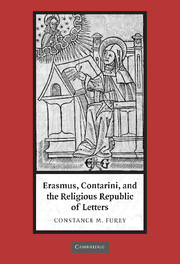Epilogue
Published online by Cambridge University Press: 10 December 2009
Summary
A friend of mine once ruefully recalled that her doctoral advisor counseled his students to live like monks. This profession, he said, originated in the monastery; the more closely you adhere to that model, the better off you'll be. This advisor's vision dovetails with the popular stereotype that academics are social recluses who live sequestered lives – not in ivory towers, perhaps, but still in imposing stone buildings and messy, book-lined studies that look intimidating or uninteresting to the uninitiated.
The Republic of Letters, by contrast, offers a model of intellectual life that puts a premium on human relationships, and it is this emphasis on sociability – on how people interact – that fascinates scholars. Yet the kind of community created by people like Pole, Contarini, Colonna, Roper, More, and Erasmus (who all wove together their love of books and learning, their desire for God, and their need for other people) suggests that a secular notion of sociability is inadequate to account for what people seek in their relationships with other people. Jürgen Habermas, a German sociologist, made the most influential argument about how the Republic of Letters influenced the development of secular society in The Structural Transformation of the Public Sphere. First published in 1962 and translated into English in 1989, this work argues that the Republic of Letters shaped modern society because people who viewed themselves as part of the learned community eschewed religious polemics and personal diatribes in favor of dispassionate, rational, polite conversation about weighty matters.
- Type
- Chapter
- Information
- Erasmus, Contarini, and the Religious Republic of Letters , pp. 166 - 170Publisher: Cambridge University PressPrint publication year: 2005



